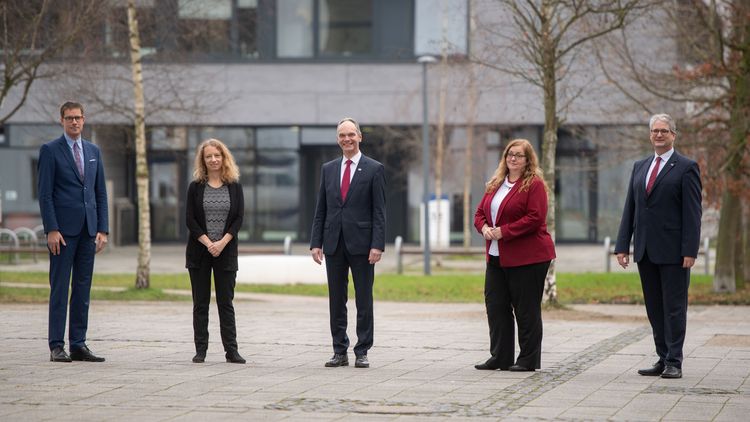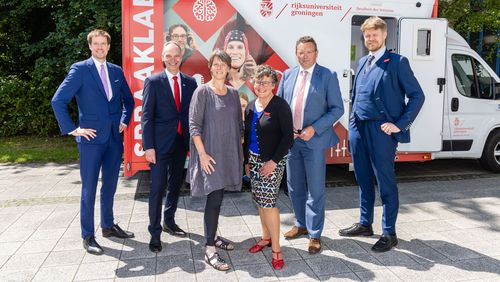Following the proposals by University President Prof. Dr. Ralph Bruder, the Senate of the University of Oldenburg has elected psychologist Prof. Dr. Christiane Thiel as the new Vice President for Research and Transfer and educationalist Prof. Dr. Karsten Speck as Vice President for Instruction and International Affairs. Special needs educationalist Prof. Dr. Annett Thiele was re-elected as Vice President for Early Career Researchers and Equal Opportunities for another two years.
The Senate's vote and the University Council's statement will now be submitted to the Ministry of Science and Culture for Lower Saxony (MWK) for the final decision. The two-year terms of the part-time members of the Presidential Board are due to begin on 1 January 2022. The eight-year term of the full-time Vice President for Administration and Finance, Jörg Stahlmann, runs until the end of 2027.
University President Prof. Dr. Ralph Bruder said he was looking forward to preparing the university for the future in the coming years together with the two established members of the Presidential Board and its two future members with proven track records in research and teaching – in line with the university's motto "Open to new approaches". The current Presidential Board will remain in office until the end of 2021. Bruder thanked the two outgoing Board members Prof. Dr. Verena Pietzner, who is moving to the University of Vechta to take up the post of president there, and Prof. Dr. Martin Fränzle for their "dedicated service" to the university.
Christiane Thiel, the future Vice President for Research and Transfer, stressed the importance of collaborative research projects for the national and international visibility of the university. She explained that effective acquisition of research funding – in collaboration with prominent academic partners – can ensure the development of infrastructure for early career researchers and in the area of equal opportunities. Thiel pledged to actively support mid-level academic staff in the acquisition of third-party funding. She also emphasized the importance of Open Science for improving the quality of research and said that she aims to reinforce the practice of making scientific research and findings freely accessible and reusable to all levels of society at the University of Oldenburg.
Karsten Speck outlined three major challenges in the area of instruction: dealing with the effects of the Covid pandemic, digitalization, and the planned accreditation system for study programmes. He emphasized the importance of on-site teaching and learning. A dynamic campus life is fundamental for academic discourse, social exchange and contact between students and teachers, he said, but added that the university will be a different place after the pandemic, and that the digitalization of instruction also has the potential to enrich teaching and learning processes. Within the context of the university's internationalization process, Speck aims to expand its strategic partnerships with the University of Groningen in the Netherlands and the Nelson Mandela University in South Africa. In addition, he advocates stronger internationalization in teacher training and a focus on improving the situation for international students and teaching staff.
Annett Thiele has set herself the goal of promoting and developing diversity awareness at the university. She sees this as an important cross-sectional task that extends the scope of equal opportunities in a meaningful way. In her second term she will complete the "diversity audit" with certifications in eight projects which she initiated in her first term. This also forms the basis of the university's first diversity strategy, she said. In addition, she plans to campaign for the implementation and evaluation of the Central Equality Plan comprising numerous measures that range from attracting more female students to MINT subjects (mathematics, natural sciences, information science and technology) to conveying gender perspectives in teaching and creating a more gender-sensitive university culture. As regards the promotion of early career researchers, Thiele plans to place a greater emphasis on career transitions both within academia and to other sectors such as culture and business. Here, too, there will be a special focus on equality and diversity. In addition, she aims to boost support for internationalization measures for young academics and to establish preventive health measures during the qualification phase.
About the new board members:
Prof. Dr. Christiane Thiel has been researching and teaching at the University of Oldenburg in the field of biological psychology since 2005. After studying psychology and neuroscience in Koblenz-Landau, Düsseldorf and Sheffield (England), she completed her doctorate in biological psychology at the University of Düsseldorf in 1999. This was followed by posts in London and at the Forschungszentrum Jülich, after which she accepted the professorship at the University of Oldenburg. In addition to her own valuable research, Thiel brings a high level of experience to her division. She was Dean of Research at the Faculty of Medicine and a member of the board of the Hearing4all Cluster of Excellence. As an expert in research ethics, she has been a member of the Ethics Committee of the German Psychological Society since 2011 and also chaired the University Senate's Research Ethics Committee for three years. She was appointed to the German Research Foundation's Review Board for Psychology in 2020.
Prof. Dr Karsten Speck has held the professorship for research methods in education and educational sciences at the university since 2010 and teaches at the Department of Educational Sciences and the Department of Special Needs Education and Rehabilitation. He studied educational science at the Martin Luther University of Halle-Wittenberg, where he completed his doctorate in 2005. He then taught and researched at the University of Potsdam before taking up the professorial position in Oldenburg. As former Dean of Studies and Dean of the university's School of Educational and Social Sciences, as well as co-founder of the East and South African-German Centre of Excellence for Educational Research Methodologies and Management (CERM-ESA), Speck brings a high level of expertise to his new position. His main academic interests – higher education research and research-based teaching and learning as well as advising education ministries – complement his area of responsibility. Speck also conducts research on cooperation among profession cultures and institutions and on measures to support children and youths with special needs, as well as on the impact of educational and social programmes.
Prof. Dr Annett Thiele has been a lecturer in Pedagogy and Didactics for Cases of Impaired Physical and Motor Development and Chronic and Progressive Diseases since 2017. She was formerly Vice Dean of the School of Educational and Social Sciences and has been Vice President for Early Career Researchers and Equal Opportunities since January 2020. After training as a paediatric nurse and studying special needs education in Bremen, she completed her doctorate at the University of Dortmund in 2007. She then did research and taught as a visiting professor at the Humboldt-Universität zu Berlin and at Leipzig University, where she was the senate representative for students with disabilities in a diversity project. A key focus of Thiele's research is increased participation of students with physical disabilities or chronic or life-threatening illnesses, for example in hospital teaching or inclusive settings, with special emphasis on children and youths with neurological motor disorders and oncological diseases.




